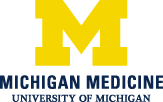Dr. Eva Feldman, Director of the ALS Center of Excellence at Michigan Medicine, joined a panel to discuss ALS for “Family Health Matters,” which is a series produced by WGVU, the PBS affiliate in Grand Rapids, Michigan. In addition to Dr. Feldman, the program featured Sherry Schuen, who receives care at the U-M Multidisciplinary ALS Clinic, and Catie Matzka, the wife of Scott Matzka who received care at U-M and passed away due to ALS in 2018. The 30-minute show originally aired on May 5 as part of WGVU’s programming to highlight ALS Awareness Month.
Some of Dr. Feldman’s comments include:
“Michigan has one of the highest prevalences of ALS in the country. The Midwest has the highest. Between Michigan and Ohio we have more ALS patients than any other state, per capita.”
“We’re interested in why such a high prevalence in Michigan. Why are we essentially the No. 1 state in the country? We’re beginning to understand that. We think that the environment plays a very large part. Michigan is both an industrial and agricultural state, so we have a lot of toxins and pollutants in our environment. We have 65 uncleaned Superfund sites, which are toxic dumps, in the state of Michigan, compared to 39 in Ohio and Indiana with 40. We think there’s an environmental hit and if you have a genetic predisposition then you’re more likely to develop the disease.”
“There are at least eight different sub-types of this disease. Different people present differently. Some people present just with a weak arm or a leg. Some people present just with difficulty speaking. The tempo of the disease, how it progresses over time, really depends on the presentation.”
“We now know that about 15-20% of this disease is inherited and runs in families. There is something called a polygenic risk score. Little pieces of multiple genes may make you more susceptible to developing ALS if you have an second insult, such as an environmental insult.”
“My hope for the future is that with continued research we can understand what causes the disease. We’re much closer now than we were 10 years ago, so progress is being made. My hope is that there will be continued funding for the research by the government and by foundations. My hope is that our patients will continue to engage with us in trying to understand what causes the disease and how we can better treat the disease and how we can better understand all different aspects of the disease. Of course, my big hope is for a cure! It will always be that way.”

